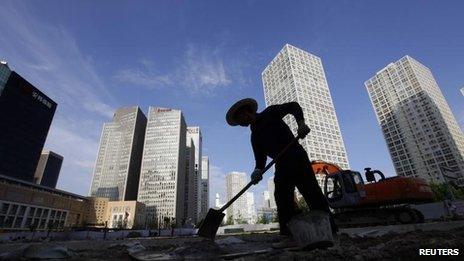Successes and failures: Hu Jintao's legacy
- Published

China's economy has soared in the decade under Hu Jintao
During the past 10 years under the leadership headed by Hu Jintao, China has achieved an extraordinary degree of success: greater, in practical terms, than any other country on Earth has managed to notch up.
To get the true level of comparison, you have to look back to the period of the British industrial revolution, or to 19th Century America at the time of the Robber Barons.
Since 2002, when the present leadership took over, China's economy has more than quadrupled. There were just a few dollar billionaires; now there are 271 - more than anywhere else.
The standard of living of a clear majority of Chinese people has risen markedly.
This has been achieved, crucially, without splitting the upper levels of the Communist Party, even though there are some senior figures who have serious doubts about the direction China has taken.
These are two extraordinary successes; and when Mr Hu and his close colleagues in the leadership step down in a few months they will have cause for very real pride.
And yet their time in office has been marked by two major failures as well: failures which may well cause big problems in the years to come.
One is the gap between the wealthy and the poor, which has grown alarmingly during the Hu years.
The other is, if anything, even more serious: the government's inability to enforce the rule of law in China.
The contrasting fortunes of China's rich and poor
Lawlessness
Again and again, intellectuals and even government officials here tell you how bad the situation is. Yet the fact that they can speak so openly about it shows, of course, that there is a distinctly greater degree of personal freedom nowadays.
Nevertheless, the signs of lawlessness are everywhere.
Two weeks ago, the old-fashioned suburb of Shiliuzhuang, in southern Beijing, was attacked at dawn by a fleet of bulldozers, and a small army of hired security men. Within hours the place was devastated.
There had been no warning, and no consultation. The local authority had agreed to the area's destruction over the heads of the population; there will be a big redevelopment here, hugely profitable for some.
But the people who have lived all their lives in Shiliuzhuang will receive little, and perhaps nothing.
The view from a flattened suburb of Beijing
A few leaflets were passed around, proposing a level of compensation which will certainly not be large enough to allow the people who have lost their houses to buy something similar in the area.
People have been beaten up for complaining, but the police have refused to get involved. A man who helped us film the destruction has found that every house he has stayed in since then has been knocked down.
In democratic countries, something like this would be unthinkable. In China, it happens all the time. The law is simply too weak to prevent it.
Wealth gap
I went to one of Beijing's petition offices to speak to the people who gather there in the hope of registering a complaint about the way officialdom has treated them. Petitioners are often beaten up and arrested by the police, simply for turning up with the details of their case.

Su Yanping went to Beijing to seek help over an illegal land grab
A crowd of several dozen descended on me the moment I appeared, thrusting their papers at me, weeping, begging me to help them.
One was a woman in her 50s, Su Yanping. Back in her native Henan, she informed the authorities about an illegal land grab which some local officials carried out. These officials, she complained, had beaten her up and set fire to her property.
Now she is back in Beijing, pleading for justice. It is hard to imagine that she will ever get it. The powerful and rich in today's China rarely need to worry about the little people.
The decade China has just lived through has been unprecedented.
In a century's time, people will still marvel at China's extraordinary rise to wealth and success, just as we marvel at the Industrial Revolution and the achievements of America's Robber Barons.
But the success will only be lasting if it is stable; and the huge divisions between rich and poor, and the absence of the widespread rule of law, show that China's growth has so far been anything but stable.
Evening up the differences and making the system work more fairly will have to be the two major priorities of the next leadership in Beijing.
- Published16 August 2012
- Published3 July 2012
- Published17 May 2012
- Published6 March 2012
- Published13 March 2012
- Published25 January 2012